Thames Iron Works Football Club
In May, 1895, West Bromwich Albion beat Aston Villa, in the FA Cup Final in front of 42,560 spectators. The game created a sensation and David Taylor, a foreman working for the Thames Iron Works and Shipbuilding Company, suggested to Arnold Hills, that maybe the company should form its own football club.
Hills, who had been involved in a bitter industrial dispute with his employees that year, thought that the formation of a football club might help improve the mood of his workforce. On 29th June, 1895, Hills announced in his newspaper, the Thames Ironworks Gazette, that he intended to establish a football club. The information appeared under the headline: "The importance of co-operation between workers and management". He referred to the dispute that had just taken place and insisted he wanted to "wipe away the bitterness left by the recent strike". Hills added: "Thank God this midsummer madness is passed and gone; inequities and anomalies have been done away with and now, under the Good Fellowship system and Profit Sharing Scheme, every worker knows that his individual and social rights are absolutely secured."
The article asked workers interested in joining the Thames Iron Works Football Club to contact Francis Payne, a senior clerk at the company. Charlie Dove, an apprentice riveter with the Thames Iron Works, was one of those who paid an annual subscription of 2/6 (12.5p) to join the club. He was joined by about fifty other colleagues in this new venture. Training took place on Tuesday and Thursday nights in a gas-lit schoolroom at Trinity Church School in Barking Road. Training mainly consisted of Army physical training exercises. They also went for runs along the Turnpike Road (Beckton Road).
Other employees who played in the team included Thomas Freeman (ship's fireman), Johnny Stewart (boilermaker), Walter Parks (clerk), Walter Tranter (boilermaker) James Lindsay (boilermaker), William Chapman (mechanical engineer), George Sage, (boilermaker), George Gresham (ship's plater) and William Chamberlain (foreman blacksmith).
Thames Iron Works in Canning Town, was London's last surviving major shipbuilding firm. In 1860 it had employed 6,000 men, but by 1895 it was half that number, and was suffering from serious competition from companies based on the River Clyde and in the North East of England.
Arnold Hills hoped that he would be able to persuade local people to watch his team play. As Charles Korr points out in West Ham United: The Making of a Football Club (1986): "Dock work was casual labour, and it was essential for dockers to live close by. The Victoria and Albert Docks were the biggest single source of employment for men in West Ham, and a great deal of cheap housing was built in the Canning Town Tidal Basin and Custom House areas of West Ham near them." It is estimated that around 7,000 men living in West Ham worked as dockers. Another 20,000 worked in local factories, with around half employed in the metal and machine trades.
Hills had himself been a talented footballer and had represented Oxford against Cambridge in the varsity match. He was also good at other sports and was the A.A.A. one-mile champion while at university. Hills also played for Oxford University in the F.A. Cup Final in 1877. For many years he was a member of the Old Harrovians and in 1879 won an international cap playing for England against Scotland. A game that England won 5-4.
In Football and the English: A Social History of Association Football in England (1997) Dave Russell points out that the Thames Ironworks football club was established as part of a "wider apparatus of company leisure institutions which included a string band, a drama group and a temperance operation." James Walvin argues in The People's Game (1994): "The football club was founded in 1895 as part of Hills's belief in the importance of cooperation between workers and management. The game would, he believed, be useful (and enjoyable) for the workers and beneficial for the company".
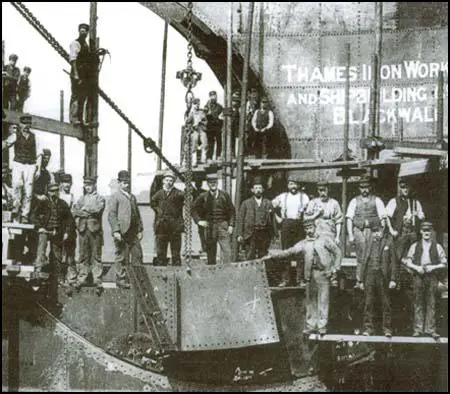
The club was financed by members' subscriptions and a generous contribution from the Thames Ironworks. It was run by a club committee made up of "clerks, foreman or supervisors at the Ironworks". As over 50 men had joined the club, it was necessary to find enough matches for two teams.
Home games took place at Hermit Road, Canning Town. It had previously been used by Old Castle Swifts, a company club sponsored by Donald Currie, the owner of the Castle Shipping Line. Old Castle Swifts had been the first professional football club in Essex but it went out of business at the end of the 1894-1895 season.
Francis Payne was appointed as club secretary. The local newspaper praised Arnold Hills for forming a football team: "If this example were only followed by other large employers, it would lead to much good feeling."
Robert Stevenson became captain of the team. He was the Thames Ironworks most experienced footballer and had previously played for Woolwich Arsenal. Other players included John Woods, who also played cricket for Essex and George Gresham, who had been a regular scorer with Gainsborough Trinity. However, the star player was the 17 year old William Barnes.
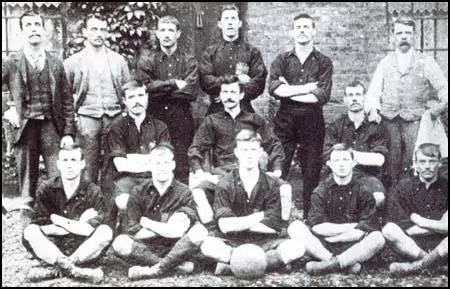
The first match was a friendly against Royal Ordnance on 7th September, 1895. The result was a 1-1 draw. This was followed by victories against Dartford, Manor Park, Streatham and Old St Stephens. The local newspaper praised Arnold Hills for forming a football team: "If this example were only followed by other large employers, it would lead to much good feeling."
At that time Millwall were champions of the Southern League and could not play against them but on 14th December, 1895, Thames Ironworks played a game against Millwall Reserves and lost 6-0.
Thames Iron Works pioneered floodlit football. The pitch was surrounded by light bulbs attached to poles. The football was dipped in pails of whitewash to make it easier to see. The first night match took place on 16th December, 1895. It was later reported that "the occasion was a success". It went onto the say that the generator "met the requirements and worked well" and "ten lights each of 2,000 candle power gave a good view to those present".
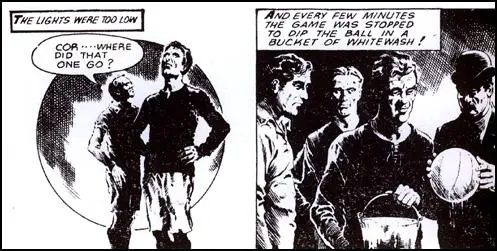
Their fourth floodlit game was against Barking Woodville. In his book, Iron in the Blood, John Powles quotes a report in the West Ham Herald: "Boys were swarming up over the fences for a free view when I put in an appearance. And what a smart man the Ironworkers have at the gate. He seemed to think my ticket was a real fraud until he had turned it upside down and inside out, and smelled at it for a considerable time. But he graciously passed me at last." The Irons won 6-2 with Charlie Dove getting a hat-trick.
On 20th March, 1896, Thames Iron Works played a night game against the famous West Bromwich Albion. The club committee arranged for the erection of canvas screens round the moat-ringed pitch, and charged the public for watching the game. WBA won 4-2.
By the end of the season the Thames Iron Works had won 30 of its 46 games. The team also defeated Barking Woodville to win the West Ham Charity Cup. The first match ended in a 2-2 draw with Robert Stevenson and Johnny Stewart scoring the goals for the Irons.
The third match took place at the St. Lukes ground at Beckton. Watched by a crowd of 3,000 people, Thomas Freeman and George Sage missed some good opportunities to open the scoring. After 20 minutes, Langford, one of Barking's forwards was forced to go off with a bad injury.
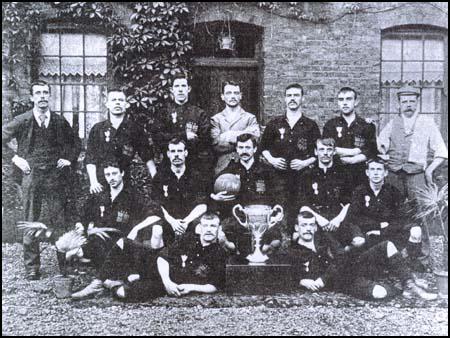
(left to right): Arnold Hills, French, Graham, Francis Payne, John Woods, William Hickman
and Tom Robinson (trainer). Centre; William Chamberlain, George Sage, William Faram,
William Chapman, William Barnes. Front; Johnny Stewart, Thomas Freeman.
In the second-half Johnny Stewart with his "mazy runs" continued to cause Barking problems. Thomas Freeman was injured and both sides were now down to 10 men. Near the end of the game, William Chamberlain had a shot deflected for a corner. George Sage took the corner and the teenage William Barnes, fired in a low, fast shot, scoring the only goal in the game.
1896-1897
In 1896 Thames Iron Works entered the London League. The team played in 'Royal Cambridge Blue' shirts and white shorts. They also wore a red cap, belt and socks.
The team had lost its star player, William Barnes, who had joined the league club Sheffield United. However, the club could still call upon the services of Robert Stevenson, Charlie Dove, Walter Tranter, George Gresham, William Chapman and George Sage. David Furnell, who worked as a labourer at the Thames Iron Works, also played his first game for the club. So also did George Neil, who had been playing local football with West Norwood.
The club secretary, Francis Payne, also signed Edward Hatton (Reading), Johnny Morrison (South West Ham), Fred Chalkley (Park Grove), Frank Dandridge and Peter Davie. The club now had enough players to field three teams every week. Payne also entered the first-team into six cup competitions.
Arnold Hills continued to take a close interest in the fortunes of the club. At the beginning of the season he sent a message to every member of the team: "As an old footballer myself, I would say, get into good condition at the beginning of the season, keep on the ball, play an unselfish game, pay heed to your captain, and whatever the fortunes of the first half of the game, never despair of winning, and never give up doing your very best to the last minute of the match. That is the way to play football, and better still, that is the way to make yourselves men."
Tom Robinson was the team's trainer. He had originally worked with Old Castle Swifts. According to the reports at the time, on the Monday following a match, the players would go on a brisk walk to free up stiff joints. Later that week they would spend time sprinting and running long distances to build up their stamina. Players also used a punchball and weights to strengthen the upper body. Only a short period was spent training with the ball.
The Irons regular line-up that season was H. Graham (goalkeeper), Robert Stevenson and George Neil (fullbacks), Frank Dandridge, Dick Bird and William Morton (half-backs), John Morrison, Charles Read, H. Butterworth, George Gresham and Peter Davie. Walter Tranter and Fred Chalkley covered the full-back position. Charlie Dove filled in wherever he was needed whereas Edward Hatton and Alex Cowie were replacement forwards. William Chapman and George Sage, two of the stars the winning West Ham Charity Cup Final Team, only got a couple of games that season.
The Irons had a warm-up friendly against Chatham Town. They were beaten 9-0 and goalkeeper Graham, who had been one of the heroes of the West Ham Charity Cup final the previous season, had a bad game and was dropped from the side.
Soon after the start of the season the club was evicted from the Hermit Road ground for violating their terms of tenancy by erecting a perimeter fence and charging admission to matches. Arnold Hills arranged to lease a piece of land at the junction of Byron Avenue and Browning Road in East Ham. In 1896 this was a huge undeveloped area.
Alf Chalk of Barking Woodville was sent off in a game against Thames Ironworks. Chalk, who was born in Plaistow and worked as a railway clerk, was one of the best players in the area. Three years later Chalk was a member of the Upton Park team that represented Great Britain and beat France in the 1900 Olympic football tournament final.
In 1897 Arnold Hills opened the headquarters of the Thames Ironworks Federated Clubs in Barking Road. Francis Payne was appointed to run the organization. Hills described Payne as the "indefatigable worker connected with the Federated Clubs and who is primarily responsible for the existence" of the institution."
Thames Iron Works lost 8-0 to Sheppey United in the first round of the FA Cup. The Irons goalkeeper, Southwood, was now replaced by Alex Duff, who had played for Scottish League side, Cowlairs, in the early 1890s. He in turn was replaced by David Furnell who played in the final game of the season against Barking Woodville.
The Irons lasted longer in the London Senior Cup and was finally knocked out by Bromley, 2-0, on 13th February, 1897. Thames Iron Works had a successful season in the league and after winning seven out of their 12 games finished second to 3rd Grenadier Guards. George Gresham, George Sage, Charlie Dove, Johnny Morrison, Charles Read and Edward Hatton all scored goals for the Hammers.
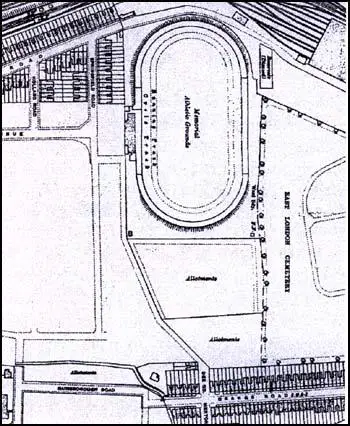
Attendances at the East Ham ground was disappointing. At the end of the season Arnold Hills announced that he had purchased land at Canning Town, Hills built what became known as the Memorial Grounds. It cost £20,000 to build and was considered to be one of the best stadiums in the country. Hills claimed it could hold 133,000 spectators and applied to hold an FA Cup Final at the Memorial Grounds. This only allowed 16 inches for each person and the Football Association turned the idea down.
Hills wanted to hold other sporting events, including cycling and athletics. As well as a football arena, it also had a cinder running track, tennis courts and an outdoor swimming pool. According to one report, the 100 feet (30.4m) long pool was the largest in England. The Memorial Grounds was opened in June, 1897. Hills made a speech where he pointed out that it had "the largest cycle track in London where they would hold such monster meetings that the attention of the Metropolis would be called to the Thames Ironworks".
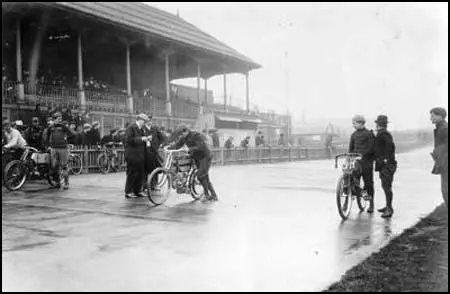
The site had been chosen because it was planned to build Manor Road railway station close to the stadium. Unfortunately the project was delayed and it was not finished until four years later. This meant that attendances at the ground were much lower than expected.
1897-1898
The Irons lost some of their best players at the end of the previous season. Robert Stevenson had returned to Scotland to play for Arthurlie. Others no longer at the club included Thomas Freeman, Johnny Stewart, Walter Parks, James Lindsay, William Chapman, William Barnes, John Woods, George Sage and William Chamberlain.
It was becoming increasingly difficult to persuade men to play for the team. A major problem was the fear of an injury that would result in them being unable to work for the Thames Iron Works Company. The club committee therefore decided to insure the players against loss of wages that might follow an injury sustained during league and cup fixtures. However, the club committee issued the players with a warning that anyone who had been injured in a match had to be home by 8.p.m. every evening. They were obviously concerned that they did not try to ease the pain by spending their time drinking in the local public houses.
Henry Hird, a ships plater, who had recently arrived from Stockton on Tees, joined the club. The Hammers also signed several players with experience of playing football at a higher level including Jimmy Reid and Robert Hounsell of Reading). Others who joined included Simon Chisholm (Inverness) and Percy Mills (Gravesend). The Sportsmen reported on 3rd September, 1897: "It is only reasonable to expect an establishment that employs nearly 5000 people to turn out a very good team of footballers. The Thames Ironworks opened their season yesterday at the Memorial Recreation Grounds... During the past few months some very capable players have found employment in the Works and as a result a very creditable exposition of the game was seen."
Season tickets for the 1897-98 were fixed at 5 shillings (25p). Tickets for individual matches cost 4d. However, attendances at games were very disappointing. Only 200 people saw the first game against Northfleet. This is not surprising when you compare this with the price of other forms of entertainment. It usually cost only 3d. to visit the musical hall or the cinema. It has to be remembered that at this time skilled tradesmen usually received less than £2 a week.
On 13th December 1897 the club secretary wrote: "The support we have received has not been so large as we should wish for, the gates not totalling near the number we might expect and certainly not so many as the quality of the play of our men should warrant."
As Dave Russell points out in Football and the English: A Social History of Association Football in England (1997): "in terms of social class, crowds at Football League matches were predominantly drawn from the skilled working and lower-middle classes... Social groups below that level were largely excluded by the admission price." Russell adds "the Football League, quite possibly in a deliberate attempt to limit the access of poorer (and this supposedly "rowdier") supporters, raised the minimum adult male admission price to 6d".
Women were initially allowed in free at some grounds as it was believed that it would improve the behaviour of make fans. When Preston North End introduced free tickets in April, 1885, over 2,000 women turned up for the game. Free entry for women was so popular that by the late 1890s all the football clubs had discontinued the scheme.
Arnold Hills sent a message to every member of the team: "As an old footballer myself, I would say, get into good condition at the beginning of the season, keep on the ball, play an unselfish game, pay heed to your captain, and whatever the fortunes of the first half of the game, never despair of winning, and never give up doing your very best to the last minute of the match. That is the way to play football, and better still, that is the way to make yourselves men."
Thames Iron Works also introduced a new kit in the 1897-98 season. The strip consisted of Royal Cambridge blue shirts, white shorts, red cap, belt and stockings. The Thames Ironworks Gazette commented that the new colours: "The contrast supplied by the delightful green turf is very pleasing." One newspaper reporter commented: "A prettier and more distinctive costume than theirs I have never yet seen on a football ground. Light blue shirts, white knickers and scarlet stockings were their colours." However, when the club played a game during a thunder storm in November, 1897, a local newspaper commented that the "Ironworks appeared on the field with brand new white spotless clean knickers and light blue shirts, but before they had been playing long they were like blackamoors".
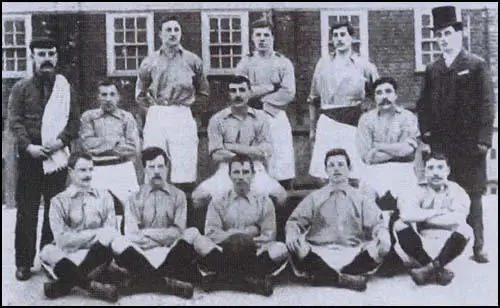
In the front row is Jimmy Reid (second from left) and George Gresham (second from right).
Thames Iron Works beat Redhill 3-0 in the first round of the FA Cup. However, they were finally knocked out by St Albans in front of 1,000 spectators. This was the third successive season that the club had been knocked out of the FA Cup by a Southern League side.
Thames Iron Works did much better in the league. They beat Leyton 4-0 at the Memorial Grounds on 2nd October, 1897, with Jimmy Reid getting two of the goals. A crowd of over 3,000 turned up to see the rematch at Leyton's ground later that month. Henry Hird and Robert Hounsell gave the Irons a two goal lead. However, in the second-half, Leyton was awarded a dubious penalty which they converted. Hird, who was still disputing the decision after the goal had been scored, was sent off by the referee. This caused some crowd trouble but the 10 man Hammers held out and even added a third goal, scored by George Gresham, before the end of the game.
The match created a great deal of comment in the West Ham Guardian. The reporter at the game blamed the Hammers for the trouble. "Why will the Thames Ironworks resort to such shady tactics to ensure victory when every member of the team can play good sound football if he likes? Arthur Russell was so badly used by the Ironworkers... that he has since been confined to his bed under the doctor's orders... This roughness should be checked by the Ironwork's committee if they have any regard for the club's good name."
These comments angered supporters of the club and one wrote to the newspaper putting forward a completely different interpretation of the game: "Now as a common or garden onlooker, I emphatically deny that the roughness was all on one side. In the opening stages of the game one of the Leyton halves adopted very shady methods, and this in the main was responsible for the greater portion of the objectionable tactics. Then, too, the ordering off of the outside left (Henry Hird) was sufficient to drive the team to desperation."
Football in the 1890s was a much more physical game than it is today. Players were allowed to "charge" an opponent. A charge was defined as a player who used his shoulder against an opponent's upper body. The main objective of this tactic was to "knock an opponent off the ball". Players were also allowed to obstruct an opponent if they were running into a space to receive the ball from a colleague.
However, players were often cautioned or sent off if they criticized a decision made by the referee. There were plenty of examples of players being ordered from the field because they had used foul and abusive language. In one game against Fulham, the Chelsea Mail reported that after a goal scored by Roderick McEachrane was disallowed, the referee "informed a section of the spectators that unless their remarks were less personal they would be removed."
The newspapers were concerned about the example being set by the football players. In his book, Iron in the Blood, John Powles, points out that a journalist reported after one London League game: "I am not an anti-tobacconist but I do not think it is at all good form for a goalkeeper to be seen smoking a cigarette in goal whilst the game is in progress, and for a linesman to be seen smoking a pipe. Yet both incidents occurred on Saturday at Ilford."
Arnold Hills used to organize a New Year party for the children of his employees. For example, this is how a local paper reported the party that brought in 1898. "Professor Anderson gave a few conjuring tricks and the young people were much amused by the comical actions of some of the Thames Ironworks Minstrels. Mr Hills gave a short address, and after nearly two hours had been spent in an enjoyable manner the children were marched out of the hall, each receiving a bun and an orange." The newspaper also reported that members of the Thames Ironworks football team were in attendance.
The Hammers were praised for the football they played that year. After their game against Queen's Park Rangers, the local paper reported: "Ironworks are a well balanced side, solid in defence, with a nippy forward line... Hird is an exceptional player both at dribbling and shooting."
In the final few weeks of the season it became clear that the title race was between Thames Iron Works and Brentford. The two teams played against each other on 23rd April, 1898. The Irons had not lost a game all season and had a one point advantage over Brentford. A party of 200 supporters left Ironworks Wharf and travelled along the Thames to Kew where they caught a train to Brentford. Watched by over 3,000 people, the game went badly for the Irons. They played most of the game with only 10 men after Arthur Woodcock had to go off with a twisted knee. Henry Hird also had a goal disallowed and the Irons lost to a goal scored by David Lloyd.
Brentford now had a one point lead with only one game to go. Brentford played Barking Woodville, who were third from bottom in the league, whereas the Irons had to face the 2nd Grenadier Guards. During the game Charlie Dove was badly injured and could play no further part in the proceedings. However, it did not stop the Irons winning 3-1 with Robert Hounsell (2) and George Gresham getting the goals. Soon after the game news arrived that Brentford had been surprisingly beaten by Barking Woodville. The Irons had won their first league title.
Nine of the league winning side played in the majority of games: George Gresham (16), Jimmy Reid (16), Simon Chesham (15), George Neil (14), Henry Hird (12) Walter Tranter (12), Charlie Dove (10), David Furnell (10) and Robert Hounsell (10). Top scorers were Gresham (12), Reid (10) and Hounsell (8).
During the season several Hammers received representative honours. David Furnell played in goal for Essex in a game against Middlesex. The former Iron, William Barnes, scored one of Essex's goals. George Neil and Walter Tranter, the club's full-backs, represented the London League against the London Football Association.
1898-1899
On 21st June, 1898, a 6,000 ton warship Albion became the first ship to be launched by a member of the royal family at the Thames Iron Works and Shipbuilding Company. The Duke of York, the future George V, and his wife, arrived for the launching ceremony in the early afternoon. Around 30,000 local people also competed to get a good view of this historic event. Over 200 people stood on a workmen's slipway alongside the uncompleted warship. At 2.50 pm the Duchess of York broke a bottle of champagne over the hull of the Albion. The ship entered the water faster than intended. This caused a massive backlash of water like a tidal wave that knocked people standing on the workmen's slipway into Bow Creek.
A total of 38 people died in the accident. This included a brother and sister, Ernest and Kittie Hopkins. Probably the saddest case was of Isabel White. When her body was recovered, her children, Lottie 5, and Queenie 2, were still clinging to her frock.
Arnold Hills was devastated by the accident and arranged to pay all the bereaved families' funeral expenses and personality visited the homes of the victims. Although the coroner criticized the organization of the launch (he recommended that in future accommodation should be provided by specially erected stands) Hills that he "met with no shadow of bitterness, no tone of complaint".
Soon afterwards two other terrible accidents had an impact on the people who lived in the area. An explosion onboard the Manitoba moored in the Albert Dock killed five workmen. This was followed by the loss of the 7,000 ton liner Mohegan on the Cornish coast. An amazing 34 members of the crew who died in the accident lived in West Ham.
It was hoped that the new 1898-1899 season would help take the workers' minds off these terrible events. That season Hills reluctantly accepted the proposal of Francis Payne that the club should recruit some professional players. Although a strong supporter of amateur football he argued it was "necessary to introduce a little ferment of professional experience to leaven the heavy lump". Payne's main argument was that better players would attract larger crowds. With attendances averaging 2,000, the club was being run at a loss and Hills was constantly being asked to subsidize the venture.
In the 1890s professional players received about £3 a week during the season, £2 during the close season. However, star players could earn over £10 a week. Clubs owned by industrialists like Arnold Hills might also provide players with a high-paying job with the company.
Others joined the club on the understanding they would be paid a generous signing on fee. This was the case with David Lloyd of the 3rd Battalion Guards. As he was a soldier he could work for Thames Iron Works. This six foot four inches defender played his first two games at full-back. He was switched to centre forward for his third game and he rewarded the club by scoring a hat-trick. The disadvantage of this scheme was that players rarely stayed long with the club. For example, in a four year period, 1896-1900 he played for four different clubs. This only came to an end when he was sent to South Africa to fight in the Boer War.
People like Arnold Hills reluctantly accepted the professionalism of football. Dave Russell attempted to explain why the upper-classes disliked this development in his book Football and the English: A Social History of Association Football in England (1997): "Professionalism, it was believed, would encourage gambling, partisanship and the will to win at all costs; turn what should be a source of pleasure and moral virtue into a mere job of work and, by leaving the professional sportsman with too much time on his hands, render him a highly unsuitable role model for the young working classes."
Francis Payne replaced Tom Robinson with Jack Ratcliffe. Robinson had been the trainer of the Thames Iron Works since 1895. The first league game of the season was against Brentford. Irons scored their first goal when George Gresham bundled the Brentford goalkeeper into the net whilst he had the ball in his hands. This was within the rules and this is why keepers tended to punch the ball rather than catching it in the 19th century. The Irons won the game 3-1.
The Irons won four of their first seven games. Their eighth game was against Fulham, who they beat 2-1. The Chelsea Mail reported that: "on the play the Irons were a much cleverer and smarter team. The forwards excelled in tricky work but against a determined defence like the Reds (Fulham) I think it was overdone... There was a vast difference in the styles of the two lines of forwards, the Reds adopting the kick and rush plan and the Irons the quick, short passing method."
In a match against Maidenhead United on 31st December 1898. Charlie Dove achieved the difficult task of playing in every position for the team when he deputized for regular goalkeeper Tommy Moore, who missed the train and was unable to get to the ground in time. Dove kept a clean-sheet as the Irons won the game 4-0.
The Irons were known for playing good football. After a game against Eastbourne Town, the local paper reported that "the visitors made a most honourably impression on the crowd... by their play, which, apart from its cleverness, was of such a strictly fair and gentlemanly character as to put many an amateur team to the blush. Their footwork was a treat to watch and their accurate heading was a feature of the game."
However, the fans of the Irons were sometimes criticized for their behaviour. After the Hammers lost 4-1 against Wycombe Wanderers, the local paper reported that "a certain section of the crowd, happily very small, made some very objectionable remarks to the Wycombe players. It is to be hoped that these enthusiast's behaviour will not be repeated."
Tommy Moore was a fine goalkeeper but he had the reputation for taking unnecessary risks. Until 1912 goalkeepers were allowed to handle, but not carry, the ball anywhere in their own half of the field. Moore developed the strategy of moving upfield and starting an attack by punching the ball into the opposition half. In a game against Chesham, the game was so one-sided that Moore spent most of the game on the offensive. Moore helped the Irons score 8 goals in the game. However, he was caught upfield when the Chesham winger broke away to put the ball into an empty net.
Thames Iron Works won 13 out of their first 16 games. Over 4,000 people turned up to see their next game against Southall, which they won 2-0. This was followed by victories against St. Albans, Wolverton and Fulham. By this stage they were already league champions. In their last game they beat Maidenhead United 10-1 with David Lloyd scoring another hat-trick. Jimmy Reid got two and this gave him a total of 9 in only 13 games.
Thames Iron Works easily won the Southern League Division 2 in the 1898-1899 season. They obtained 9 points more than their nearest rivals Wolverton and Watford, who tied for second place. Outstanding performers that season included Charlie Dove, Tommy Dunn, Tommy Moore, Henry Hird, George Gresham, Walter Tranter, Jimmy Reid and Roderick McEachrane. The main star was David Lloyd who scored 12 goals in only 11 league appearances.
Arnold Hills, raised doubts about the wisdom of employing highly paid professionals. At the end of the season he wrote: "The committees of several of our clubs, eager for immediate success, are inclined to reinforce their ranks with mercenaries. In our bands and in our football clubs, I find an increasing number of professionals who do not belong to our community but are paid to represent us in their several capacities... Now this is a very simple and effective method of producing popular triumphs. It is only a matter of how we are willing to pay and the weight of our purses can be made the measure of our glory. I have however, not the smallest intention of entering upon a competition of this kind: I desire that our clubs should be spontaneous and cultivated expressions of our internal activity."
1899-1900
Francis Payne, the club secretary, was given the task of finding good players for Thames Iron Works first season in the top division of the Southern League. According to one report, Arnold Hills, gave Payne £1,000 to find the best players available.
Payne employed an agent and former professional footballer named Charles Bunyan to obtain a player based in Birmingham. Bunyan missed his appointment with the player targeted by Payne. He then approached another player he thought might be interested in joining the club. However, this player reported Bunyan to the Football Association. The FA held an investigation into the matter and as a result, Bunyan was suspended for two years. Payne was also suspended and the Thames Iron Works was fined £25.
In 1900 the Football League introduced a maximum wage of £4 per week. This was double what a skilled tradesmen received at this time. At the same meeting they also voted to outlaw match bonuses. To encourage men to play for clubs for some time, players were to be awarded a benefit after five years. It was claimed at the time that this was an attempt the curb the power of the wealthier clubs. For example, some of West Ham's London rivals had far higher attendances. During the early 1900s Chelsea and Spurs had an average of around 30,000 people watch their home games.
George Neil became the new secretary/manager. He immediately made three important signings from Tottenham Hotspur: Tom Bradshaw, Bill Joyce and Ken McKay. Initially, Arnold Hills, refused to sanction the transfers because he claimed the club could not afford them, but he eventually relented. Bradshaw who played on the left-wing for England against Ireland in 1897, whereas Joyce and McKay had done well in Scotland before moving south.
Albert Carnelly, a talented inside forward, was signed from Bristol City. Payne also signed Charles Craig from Dundee and Syd King from New Brompton. King was considered to be the best full back in the Southern League and Derby County, one of the best teams in England, challenged Thames Iron Works for his signature.
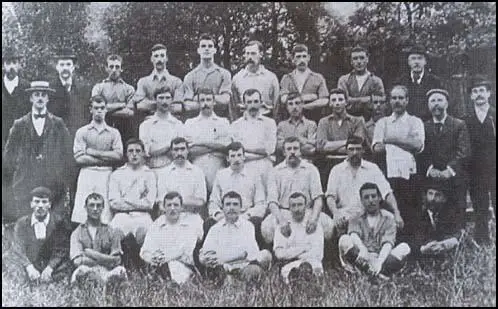
H. Sunderland, Henry Gilmore, F. Adams. Second row: Fred Corbett, Charlie Dove,
Tommy Dunn, Syd King, James Bigden, L. Foss, M. Higham, Sam Wright (trainer).
Seated; W. James, Ken McKay, Tommy Moore, Albert Carnelly, Tom Bradshaw.
Front; J. Walker, Peter McManus, Bill Joyce, Roderick McEachrane, Simon Chisholm.
All the top clubs at that time had a large number of Scots in the team. The Pastime Magazine write: "The spectator does not care, whether his team or village team is composed of bona fide natives ior Scotchmen hired from afar. Provided that they win their matches, he is well satisfied."
At the beginning of the 1899-1900 season, the Irons had ten Scots in their squade: Bill Joyce, Ken McKay, Tommy Dunn, Peter McManus, Roderick McEachrane, Jimmy Reid, William Stewart, Simon Chisholm, Tommy McEwan, George Reid, Patrick Leonard and Robert Allan.
George Neil also replaced George Radcliffe with Sam Wright as trainer. It is believed that Wright was recommended by Syd King who had worked with him at New Brompton. Radcliffe became Wright's assistant.
As the Irons were now in the top league it was decided to increase season ticket prices. It was now 10s. 6d (52.5p) for the grandstand and 7s. 6d. (37.5p) for the rest of the ground. The first home game was against Chatham. The attendance of 1,000 was lower than most games the previous season and was probably a reaction to the price rise.
The Irons team that day was: Tommy Moore, Tommy Dunn, Charlie Dove, Peter McManus, Roderick McEachrane, Fred Corbett, Ken McKay, Bill Joyce, Albert Carnelly, and Tom Bradshaw. They won the game 4-0 with Carnelly and McKay both scoring a couple of two goals.
The next two games were in the FA Cup and both ended in easy victories. They beat Royal Engineers 6-0 and Grays United 4-0. This was followed by a 1-0 league victory against Brighton United. These four victories encouraged local supporters to see the next home game against league leaders, Bedminister. The Irons won the game with a Bill Joyce penalty.
Hammers good form continued when the beat Dartford 7-0 in the next round of the F.A. Cup (Albert Carnelly 2, Ken McKay 2, Bill Joyce, Roderick McEachrane, Tom Bradshaw). The new signings were doing especially well and the Irons were accused of buying success. This is what a Dartford newspaper had to say about the game: "No one was greatly surprised at the 7-0 result. In these days the banking account has to be considered and the luxury of passing into the next round with little effort has proved an expensive one to the Ironworks. No more than 1400 were present and roughly speaking £30 was taken at the gate. Consequently the Thames share does not reach the wages bill, quite apart from the other expenses."
The reporter went on to praise the quality of the performance: "The Irons played the passing game with quick and accurate exchanges and there was no time to stop their defence which was on the Dartford men in a second... That the Works were far more superior is beyond all doubt."
The first big game for the Irons was an away against their long-time rivals, Tottenham Hotspur. The club organized "horse brakes and buses" to take supporters from Canning Town to White Hart Lane. The 7,000 crowd watched the Irons take a 7-0 beating. The game was at first fairly even but Tommy Dunn "ricked his hip" and was forced to leave the field. Tommy Moore sustained a "serious injury to thumb", Peter McManus ("knee badly cut") and Bill Joyce ("three deep wounds on the right knee") were also injured. At a time where substitutes were not allowed, the Irons were down to 7 fit men.
It was the turning point of the season. The Irons lost 8 of their next 10 games. Several regulars missed games with injuries, including Tommy Dunn, Peter McManus and Bill Joyce. Tom Bradshaw who had started the season so well, and was captain of the team, was taken ill and died of consumption on Christmas Day 1899. However, one close friend was convinced that he died as a result of a kick to the head he had received while playing for Liverpool. Bradshaw complained that he suffered terrible pains when he headed the ball. Bradshaw, who was only 26 years old, left a widow and two young children.
Four day's after Bradshaw's death the Irons played Queen's Park Rangers at the Memorial Grounds. Once again the home side lost. The local newspaper reported that the fans did what they could to encourage the Hammers: "At intervals during the game a chorus of about twenty voices felt it a duty to jerk - I say "jerk" advisedly - out some encouragement to this effect: "Pl-a-a-y up I-I-ron-wor-ks". The voices were the nearest approach to that of a foghorn I have ever heard on the mainland. Such a distracting row, surely, was never intended to help our fellows on."
The Irons were also knocked out of the FA Cup by Millwall. 13,000, the largest crowd of the season at the Memorial Grounds, watched Millwall win 2-1. The local newspaper criticized the home fans for not being as vocal as the visitors. The reporter suggested that the Millwall supporters "must have had cast iron lungs as they were shouting all afternoon".
Millwall also beat the Irons 2-0 at the Memorial Grounds in the league. This time there was 12,000 to see the match. However, Thames Iron Works did get revenge in the return game, with Ken McKay scoring the only goal of the game.
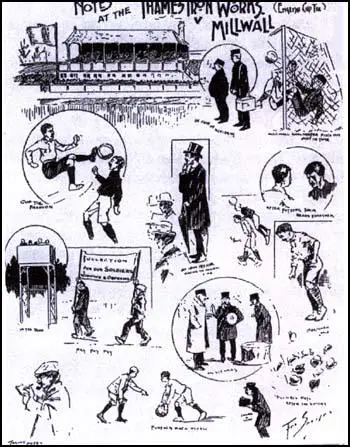
Thames Iron Works finished second from bottom in the league that season. They therefore had to play a Test Match (play-off) against Fulham, who had finished as runners-up in the Second Division. Bill Joyce scored a hat-trick in the Irons 5-1 win.
The club's new signings had a good season. Bill Joyce scored 18 goals in all competitions. Albert Carnelly got 14 and Ken McKay finished third in the list with 13. These three men were responsible for 24 of the goals scored that season in the league. However, the other players contributed only six and 30 goals in a season was just not good enough. For example, the champions that year, Tottenham Hotspur, scored 67 goals.
1900-1901
In 1900 Arnold Hills decided to expand his business interests by acquiring the engineering firm of John Penn & sons. In order to raise new capital to finance the takeover, he decided to make Thames Iron Works and Shipbuilding Company a public company. This meant that in future he would be accountable to shareholders. Hills was no longer in a position where he would be allowed to pump company money into the football club.
On 7th March, 1900, the West Ham Guardian reported that: "It is announced that the committee of Thames Ironworks FC are to consider some sort reorganization. A proposal is evidently on the table. For one who has it on authority says it will 'if adopted, undoubtedly be to the club's advantage'. This is good news. Supporters are tired of seeing the club so low down as fourth from the bottom".
A few weeks later the West Ham Guardian reported that the football would be sold. "With regard to next season however, a meeting will be called, and the Mayor of West Ham will be asked to preside, at which gathering the locals will be asked to take up 500 £1 shares. If this amount be raised Mr A. F. Hills will add to it another £500, and, in addition, grant the use of the Memorial Grounds. Another condition is that all members of the team must be teetotallers. It is probable too, that the name of the club will be changed to Canning Town." The newspaper was wrong about this and the new club was called West Ham United. The idea that all players should be teetotallers was also dropped.
It was hoped that over 2,000 supporters would buy shares in the new club. The West Ham Guardian urged local people to buy shares: "There is little question that the present question of managing small teams is not the right one. For so many clubs get into debt and finally are snuffed out... A shareholder will have everything to gain, by attending the matches, and inducing others to come with him, therefore it seems to me that the nail has been hit right on the head, and the problem of the football world of management is about to be solved."
Hills announced that anyone who purchased just ten shares would be allowed to join the Board of Directors of the club. Despite this offer, a large number of shares remained unsold and the the finances of the new club remained in a poor state. had trouble selling these shares to supporters.
In September, 1900, The Morning Leader reported: "The prospectus of the new limited liability company, to be known under the title of the West Ham Football Club Company Limited is at hand. The primary object will be to encourage and promote the game of football in West Ham and district, and powers have also been taken by the company authorising them at any time to acquire land and other property."
It was also announced that: "The directors propose to make the following charges, to shareholders only, for season-tickets for the football season 1900/01: admission to ground and open stand, 7s 6d, admission to ground, enclosure and grand stand 10s 6d and 12s 6d respectively.... Mr. A. F. Hills who will most likely to take up £500 worth of shares, is very keen on playing a teetotal eleven next season, and the experiment is worth trying if only to vindicate the rights of football employers to call their own tune after paying the piper."
The capital of West Ham United was £2,000 (4,000 shares at 10s each). Arnold Hills purchased 1,000 shares and remained the major influence at the club. However, he was unable to enforce the idea that all players should be teetotallers.
Lew Bowen, a clerk at the Thames Iron Works & Shipbuilding Company, became the new club secretary. The club made several new signings including: Hugh Monteith (Bristol City), Fergus Hunt (Arsenal), Freddie Fenton (Gainsborough Trinity), George Radcliffe (Grimsby Town), James Reid and Billy Grassam (Port Vale) and Albert Kaye (Chatham Town).
These new players joined established players in the team such as Charlie Dove, Roderick McEachrane, Fred Corbett, Charles Craig and Syd King. Walter Tranter returned from a spell with Chatham Town, but the club did lose the services of top scorers, Bill Joyce, Albert Carnelly and Ken McKay.
The season started well with a 7-0 victory over Gravesend United (Grassam 4, Reid 2, Hunt). West Ham could not maintain that momentum and lost 7 of its next 13 games. That included a game at Millwall that attracted a crowd of 10,000. The best attendance that season at the Memorial Grounds was the game against Tottenham Hotspur. Unfortunately for the home supporters, they saw West Ham defeated 4-1.
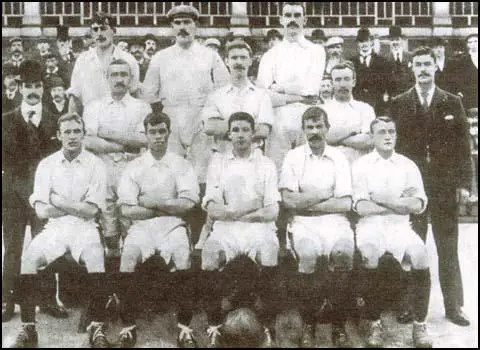
Queen Victoria died in January, 1901. The Football Association called for a stoppage to all soccer on the Saturday following the death of the monarch. The Southern League objected to this directive on the grounds that this was an infringement of a professional footballers' right to earn a living. West Ham's game with Watford on the 26th January was one of only four Southern League fixtures that went ahead. West Ham won the game with Billy Grassam scoring the only goal of the game.
Fred Corbett, a 19 year-old, who had worked as a labourer at the Thames Iron Works and Shipbuilding Company in Canning Town, had a good first season at the club. According to Phil Vasili, the author of Colouring Over the White Line: The History of Black Footballers in Britain (2000), Fred Corbett was only the third black footballer after Andrew Watson and Arthur Wharton to play in league football in England. Corbett played 21 games that season and scored a total of 7 goals.
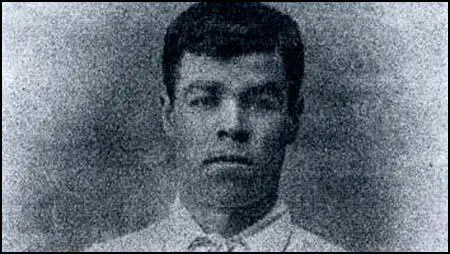
Results improved after Christmas and by the end of the season West Ham was in sixth place behind Southampton, Bristol City, Portsmouth, Millwall and Tottenham Hotspur. West Ham's goals were scored by Billy Grassam (15), Fred Corbett (9), James Reid (5), Albert Kaye (5), George Radcliffe (4) and Fergus Hunt (4).
West Ham had a good run in the FA Cup and over 12,000 saw them draw 1-1 with Clapton Orient. West Ham won the 5th round replay 3-2 with Billy Grassam scoring a hat-trick. The next round saw the visit of mighty Liverpool. Watched by a home crowd of 6,000, Liverpool won 1-0.

Primary Sources
(1) Thames Ironworks Gazette (29th June, 1895)
The importance of co-operation between workers and management". He referred to the dispute that had just taken place and insisted he wanted to "wipe away the bitterness left by the recent strike". Hills added: "Thank God this midsummer madness is passed and gone; inequities and anomalies have been done away with and now, under the Good Fellowship system and Profit Sharing Scheme, every worker knows that his individual and social rights are absolutely secured.
(2) Syd King, The Book of Football (1905)
In the summer of 1895, when the clanging of "hammers" was heard on the banks of Father Thames and great warships were rearing their heads above the Victoria Dock Road, a few enthusiasts, with the love of football within them, were talking about the grand old game and the formation of a club for the workers of the Thames Ironworks Limited. There were platers and riveters in the Limited who had chased the big ball in the North country. There were men among them who had learned to give the subtle pass and to urge the leather goalwards. And so when the idea was first suggested that an amateur club should be formed, it met with a ready response from the employs of the Thames Ironworks. These early organisers, of what, in a later age, is known as West Ham United, also found a generous patron in Mr. A. F. Hills...
On September 7, 1895, eleven men from the works turned out at Hermit Road to play the reserve team of the Royal Ordnance F. C. The pages of history record that the result was a draw, 1-1, and everybody went home satisfied.
Bob Stevenson who captained Woolwich Arsenal at one period of their existence, was the first captain of the Thames Ironworks, and in those early days the training was done on week nights at a school-room in the Barking Road. The players used also occasionally to go out for a moonlight spin on the turnpike road. Their trainer was Tommy Robinson, and he is still trainer to West Ham United. There is a break of several seasons in his service, however, during which we saw him smoking his cigar on match days and thinking hard when the game was going against the side in which he has always taken a deep interest.
(3) Brian Belton, Founded on Iron: Thames Ironworks and the Origins of West Ham United (2003)
At first Thames Ironworks did not join a league. It is not known if this was a conscious decision, but Thames' first timetable of matches was much closer to the schedule of a professional club than that of a typical works team. It included matches against one First Division team and two clubs from the Southern League.
With Thames now ready for their first season of football, Dave Taylor stood down from his position to concentrate on refereeing and was replaced by A.T. (Ted) Harsent, another Thames Ironworks employee who lived close to the Works in Mary Street, Canning Town. Harsent became the first secretary of Thames Ironworks Football Club. Francis Payne was the chair of the new club; he worked as a company secretary in the Ironworks. Payne was involved in several of the other works associations, most notably as vice president of the Temperance League. I he existence of this particular group, alongside Arnold Hills' personal commitment to alcoholic abstinence, might go some way to explaining why the first Ironworks teams were teetotal and also non-smokers. Five years later, when Thames Ironworks FC had become West Ham United, the Fast Ham Edro still referred to the team as "The Teetotallers".
(4) Charles Korr, West Ham United: The Making of a Football Club (1986)
Dock work was casual labour, and it was essential for dockers to live close by. The Victoria and Albert Docks were the biggest single source of employment for men in West Ham, and a great deal of cheap housing was built in the Canning Town Tidal Basin and Custom House areas of West Ham near them." It is estimated that around 7,000 men living in West Ham worked as dockers. Another 20,000 worked in local factories, with around half employed in the metal and machine trades.
(5) The West Ham Herald (December, 1895)
Boys were swarming up over the fences for a free view when I put in an appearance. And what a smart man the Ironworkers have at the gate. He seemed to think my ticket was a real fraud until he had turned it upside down and inside out, and smelled at it for a considerable time. But he graciously passed me at last.
(6) Arnold Hills, statement (September, 1896)
As an old footballer myself, I would say, get into good condition at the beginning of the season, keep on the ball, play an unselfish game, pay heed to your captain, and whatever the fortunes of the first half of the game, never despair of winning, and never give up doing your very best to the last minute of the match. That is the way to play football, and better still, that is the way to make yourselves men.
(7) The Sportsmen (3rd September, 1897)
It is only reasonable to expect an establishment that employs nearly 5000 people to turn out a very good team of footballers. The Thames Ironworks opened their season yesterday at the Memorial Recreation Grounds... During the past few months some very capable players have found employment in the Works and as a result a very creditable exposition of the game was seen."
(8) Arnold Hills, statement (May, 1899)
The committees of several of our clubs, eager for immediate success, are inclined to reinforce their ranks with mercenaries. In our bands and in our football clubs, I find an increasing number of professionals who do not belong to our community but are paid to represent us in their several capacities... Now this is a very simple and effective method of producing popular triumphs. It is only a matter of how we are willing to pay and the weight of our purses can be made the measure of our glory. I have however, not the smallest intention of entering upon a competition of this kind: I desire that our clubs should be spontaneous and cultivated expressions of our internal activity."
(9) West Ham Guardian (7th March, 1900)
It is announced that the committee of Thames Ironworks FC are to consider some sort reorganization. A proposal is evidently on the table. For one who has it on authority says it will 'if adopted, undoubtedly be to the club's advantage'. This is good news. Supporters are tired of seeing the club so low down as fourth from the bottom.
(10) The Morning Leader (September, 1900)
The prospectus of the new limited liability company, to be known under the title of the West Ham Football Club Company Limited is at hand. The primary object will be to encourage and promote the game of football in West Ham and district, and powers have also been taken by the company authorising them at any time to acquire land and other property... The directors propose to make the following charges, to shareholders only, for season-tickets for the football season 1900/01: admission to ground and open stand, 7s 6d, admission to ground, enclosure and grand stand 10s 6d and 12s 6d respectively.... Mr. A. F. Hills who will most likely to take up £500 worth of shares, is very keen on playing a teetotal eleven next season, and the experiment is worth trying if only to vindicate the rights of football employers to call their own tune after paying the piper."

